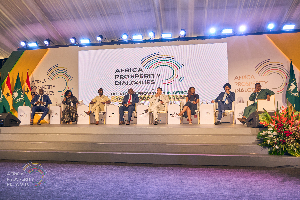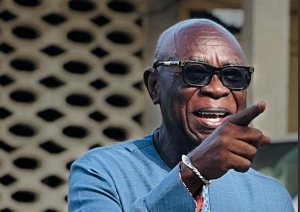Under an operation called “Planting for Food and Jobs,” the Government of Ghana, would collaborate with the private sector to invigorate agriculture for higher food productivity for the nation to become the food hub of West Africa.
With the confidence of the success of the programme, Food and Agriculture Ministerial nominee, Dr Owusu Afriyie Akoto said:”Ghana can actively supply food for the rest of West Africa.”
Appearing before the Appointments Committee of Parliament, in Accra, for vetting for the position, the nominee, 57 and a Cambridge-trained Agricultural Economist, said the operation would engage all Government officials, Members of Parliament, Chief Executives, and in all the 216 Metropolitan, Municipal and District Assemblies.
The Former Member of Parliament for Kwasado in the Ashanti Region, was also the Minority Spokesperson on Agriculture,
Reminiscent of a similar programme called “Operation Feed Yourself” in the 1970s, where Ghanaians were encouraged to use every spared space to plant a food crop, Dr Akoto announced that the Government would provide stimulus packages for signees on the programme.
The programme would focus on some selected cash and food crops.
He spoke of a similar a programme in neighbouring La Cote d’ Ivoire and expressed strong hope that Ghana could beat her neighbour if the operation was vigorously pursued.
The programme, scheduled take off next March in the next farming season, he said was expected to create more than 750,000 jobs for the youth.
”Ghana over the next four years will get to the stage of La Cote d’ Ivoire or better,” he emphasised.
“Ghana has great potential in all kinds of cash crops, except that we have not set ourselves up for the growth.”
Dr Akoto identified low productivity as the main challenge to agriculture and attributed the lack of interest in the sector and cocoa farming to poor returns.
He recalled that Ashanti New Town, in the Ashanti Region, was built with cocoa revenue, when returns were high, exclaiming, “I was excited walking under the cocoa trees, but the penury of the farmer is not making farming attractive.
“We need to make agriculture attractive until that happens, the kids will run away from the farm.”
He assured Ghanaians that the Government would invest massively in infrastructure development to also attract foreign direct investments (FDI) into the sector.
“The government of President Akufo-Addo is determined to make agriculture a priority sector in terms of public investment, already, we are attracting the world’s attention,” he said, and announced that some foreign investors in the sector were already in talks with the Government for partnerships due to its assurances.
“Last week, a group came from South Africa, I sent them out to the field to Afram plains, to Kintampo and other places and they came back very excited based on the assurances that I gave them that this government is going to support the sector with infrastructure, roads and so on and all that, and they are coming back with a boatload of cattle, young cattle, sheep and goats.
“Not only that, people have come from America, they are very interested in investing based on what they have heard that we are doing and determined to do.”
He rejected suggestions that the Plant Breeders Bill was meant to promote the introduction and use of genetically modified seeds in the country, and insisted that his support for the legislation was to encourage farmers to use improved seeds developed by Ghanaian scientists for higher yields and to attract compensation for the laborious scientific work.
A group called Food Sovereignty Ghana (FSG), a food advocacy has raised concerns over the use of genetically modified seeds, saying they had long-term effects on the health of consumers and quality of the soil.
The group recently petitioned the Committee to disqualify Mr Afriyie-Akoto over his stance on the subject, but the nominee described the calls as misplaced, to which the chairman Mr Joseph Osei-Owusu wondered why the group’s insistence, as the matter had been discussed largely at another committee level.
Dr Akoto explained his support for the Bill saying:”The Science which exists, and which has produced these 40 different improved varieties for our farmers of maize, rice and others, we have hardly used it. Only 11% of maize farmers are using improved seeds.
“There rest are using local varieties, which is getting them nowhere. The task really is to ensure that the bulk of farmers adopt these improved seeds, get them fertilisers and extension service so that our production can take off. It is not to bring some GMO into this country.”
He added that “Whoever says I am promoting GMO is not correct. I believe in Ghanaian scientists, Ghanaian scientists have done well in the field of hybrid technologies and that is where our interest is.
Mentioning the “obaatanpa” maize variety as an example, Dr Akoto said: “In West Africa… All these other improved seeds that our research have been putting their backs to the wheel will earn the scientists in this country some money in the future and not some GMO…”.
When a member of the Committee expressed concern over the Government’s Cocobod Scholarship Scheme, saying the Scheme was in some way supporting city dwellers and staff of the agency, rather than the education of children of rural cocoa farmers, the nominee assured Ghanaians that when given the nod, the program would be reviewed.
General News of Wednesday, 25 January 2017
Source: GNA
Ghana to become food hub of West Africa - Dr Afriyie Akoto
Entertainment
















